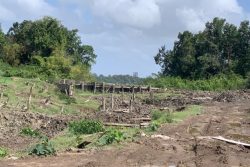Dear Editor,
Monday, April 28, the Moray House hosted a very profound presentation by Bert Carter on ‘The drainage of Georgetown.’ The Mayor of the capital was there as well as several authorities who have served the capital in times when alleyways were accessible, dozens of people didn’t sleep on the street and water flowed through the street gutters when it rained and school kids ran in them in dry weather. Who was not there were those current people in the field of civil engineering that Mr Eddie Gonsalves insisted that he had invited.
The presentation constituted an outline of the drainage in Georgetown, and the audience was guided into the brilliant drainage design that separates us from the formidable forces of nature. I cannot elaborate on the data presented that we just didn’t know, from the ruins of shipwrecks in the Demerara River, to the significant design and purpose of the kokers that we take for granted. The Mayor responded to the questions that were directed at him concerning the current state of the capital. His responses were enlightening, and especially the aspects of simplemindedness from the authorities in a past experience who could not distinguish that to repair the City Hall is a task of restoration rather than a carpentry project.
The fact is the current state of Georgetown lies squarely with the spite politics of the state which have never politically won the city. This lecture clinically informed us that since the passing of former President Jagan of this political administration, mediocrity and small-minded attitudes have overshadowed the capital, resulting in a building lawlessness, the encumbering of waterways and an overall deterioration of City Hall, and the deplorable state of our largest ward, Le Repentir cemetery, which is a disgrace.
Mr Stanley Ming proceeded to explain the effects of global warming and its impact on our vulnerable populated coastland capital and villages. The September 2013 edition of National Geographic had an attached map indicating the possible results of continued Arctic meltdown by the end of this century. The fact is that there are even more serious issues before us should we continue to ignore the drainage of the capital and the coastal belt; how long will Georgetown be able to avoid some epidemic with its cluttered stagnant waterways, constant flooding and the stench of excrement due to the hundreds of addicts and mental cases that sleep in our streets and parks? The coastal population is trapped. In the event of a threat from the sea we are doomed, because there are no exit highways and streets that lead to the high grounds of Guyana from the coast and most likely the East Bank Road will be compromised in the event of such a tragedy. I must remind concerned persons that the 2005 floods were not a consequence of global warming but rather of habitual human error and ‘lackadaisicalness.’ These very shortcomings constitute the same arbitrary mindset of this government that is currently playing politics with Georgetown and our delicate sea defences.
Despite the reality of global warming, we are entitled to have Georgetown returned to its functioning self. There’s a possibility of not seeing the awesome effects of the disappearance of Paramaribo, Georgetown and London in our lifetimes. If we remedy Georgetown then the prototype of standards for the next capital will be passed on to a next not so lazy generation of civil professionals. I say this on the grounds of the shabby housing development layouts I’ve seen over the last 15 years, that demonstrate that our ancestors after slavery were better civil engineers in their layout of villages on the plantations they bought some one hundred and eighty years ago, and they had to dig their canals with shovels, and contend with mud roads. Yet their villages catered for living and structured farming backlands.
Recently the Speaker of the House proposed an initiative to establish a body of elders, who would ensure a necessary pool of experience and raw knowledge, providing functional guidance. We’ve had the dismal experience of ‘Bharrat,’ a truly dismal era. All nations rely on their elders; we retire ours at fifty-five and dismiss them. I support the Speaker of the House on this effort to harness this retrogressive custom of ours, sustaining much needed experience in an age where the difference in survival lies with not between the rich and the poor, but between those who know and those who don’t.
Yours faithfully,
Barrington Braithwaite





